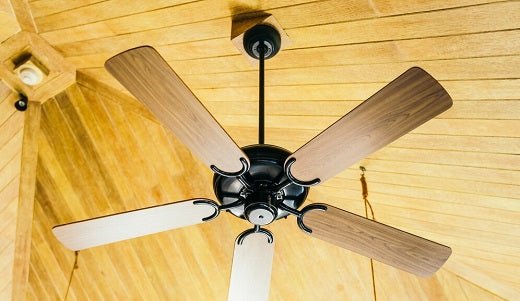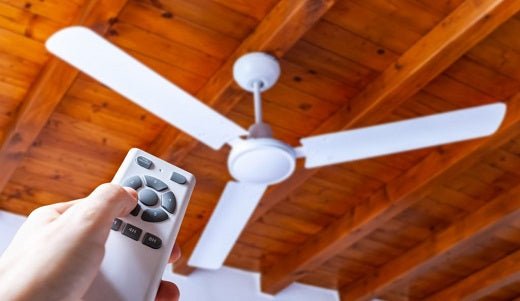recent articles
- AC Vs. DC Ceiling Fans: Which One Is Right For You?
- Choosing The Right Blade Material For Your Ceiling Fan: Factors To Consider
- Efficient Fan Usage: Tips For Using Ceiling Fans To Supplement Your HVAC System
- Energy-Efficient Cooling: Exploring The Advantages Of DC Motor Ceiling Fans
- Choosing The Right Ceiling Fan: A Comprehensive Buyer's Guide
- 5 Fan-Tastic Ways To Maximize Your Fan’s Efficiency
- Mastering the Art of Uninstalling a Ceiling Fan: A Step-by-Step Guide
- Enhancing Comfort: Mastering Wall Fan Sizing and Positioning
- Ceiling Fans Vs. Air Conditioners: Pros And Cons For Different Situations
- Bladeless Ceiling Fans
- Misting Fan Buying Guide
- What Is CFM in a Ceiling Fan?
- Which direction should my Ceiling Fan spin in Winter?
- The Matthews Fan Company Story
- What Size Ceiling Fan Do I Need
AC Vs. DC Ceiling Fans: Which One Is Right For You?
When it comes to choosing Ceiling Fans for your home, you may come across two main types of motors: AC (alternating current) and DC (direct current). Each type has its own set of benefits and disadvantages, so it's important to understand the differences between them before making a decision. In this guide, Todays Fans explores the differences between AC and DC ceiling fan motors to help you choose the right one for your needs. AC motors are the traditional choice for ceiling fans and have been used for decades. They are known for their reliability and durability, making them a popular choice for many homeowners. However, AC motors are generally less energy-efficient than DC motors, which can lead to higher electricity bills over time. DC motors, on the other hand, are more energy-efficient and can help you save money on your utility bills. They also offer greater control over fan speed, allowing you to adjust the airflow to suit your preferences. Additionally, DC motors tend to be quieter than AC motors, making them ideal for use in bedrooms or other quiet spaces.
What is the Difference Between AC and DC Ceiling Fan Motor Type?
The primary difference between AC and DC ceiling fan motors lies in the type of current they use. AC motors run on alternating current, which is the standard electrical current used in most homes. DC motors, on the other hand, run on direct current, which is typically used in batteries and other low-voltage applications. AC motors are known for their simplicity and reliability, while DC motors are often more efficient and offer greater control over fan speed. DC motors also tend to be smaller and lighter than AC motors, making them ideal for use in ceiling fans. Additionally, DC motors are generally quieter than AC motors, which can be beneficial in spaces where noise is a concern. DC motors are also more durable than AC motors, with fewer moving parts that can wear out over time. These factors make DC ceiling fans a popular choice for those looking for energy-efficient, quiet, and durable fan options. As technology continues to advance, DC motors may become even more prevalent in ceiling fans, offering homeowners more choices for efficient and effective cooling solutions.

Benefits and Disadvantages of AC Ceiling Fans
AC ceiling fans have been the standard for many years and are known for their durability and reliability, especially for Indoor Ceiling Fans. They are typically less expensive than DC fans and are suitable for most residential applications. However, AC fans are generally less energy-efficient than DC fans and may not offer as much control over fan speed. They also tend to be noisier than DC fans, especially at higher speeds. Additionally, AC fans may require more maintenance over time, as the motor and other components may need to be replaced more frequently than with DC fans. Despite these drawbacks, AC fans remain a popular choice for many homeowners due to their affordability and widespread availability. They are also available in a wide range of styles and designs, making it easy to find one that complements your home decor.
Benefits and Disadvantages of DC Ceiling Fans
- Energy Efficiency: DC ceiling fans use less power than AC fans, making them more environmentally friendly and cost-effective in the long run.
- Quiet Operation: DC fans are known for their quiet operation, making them ideal for bedrooms, living rooms, and other quiet spaces.
- Greater Control: DC fans offer greater control over fan speed, allowing you to adjust the speed more precisely to suit your comfort level.
- Lighter and More Compact: DC fans are typically lighter and more compact than AC fans, making them easier to install and suitable for a variety of settings.
- Higher Cost: DC fans are generally more expensive than AC fans upfront, which can be a drawback for some buyers.
- Specialized Power Source: DC fans may require a specialized power source, such as a dedicated DC power supply or a compatible wall control, which can add to the cost of installation.
- Limited Availability: While DC fans are becoming more popular, they may not be as readily available as AC fans, which can make them harder to find in certain styles or designs.
In conclusion, DC ceiling fans offer several advantages over AC fans, including energy efficiency, quiet operation, and greater control. However, they also come with a higher upfront cost and may require a specialized power source. Ultimately, the choice between AC and DC fans will depend on your priorities and budget.

AC vs DC Ceiling Fan – Which Should I Choose?
When deciding between an AC and DC ceiling fan, it ultimately comes down to your priorities and budget, especially for Dual Ceiling Fans. If you're looking for a reliable and cost-effective option, an AC fan may be the way to go. However, if energy efficiency and quiet operation are important to you, a DC fan may be worth the investment. Todays Fans offers a variety of AC and DC ceiling fans to suit your needs, so you can find the perfect fan for your home. Visit our store today to explore our selection and find the right fan for you. In conclusion, both AC and DC ceiling fans have their own set of advantages and disadvantages. Understanding the differences between the two can help you make an informed decision and choose the right fan for your needs.















Anastasia Bieloborodko